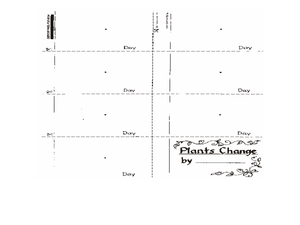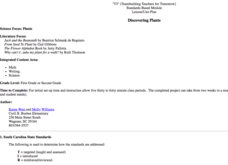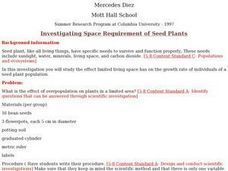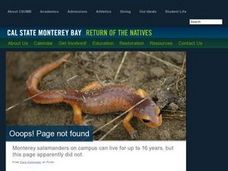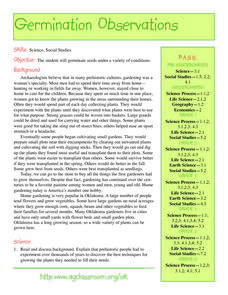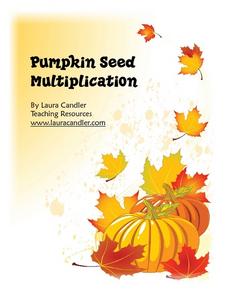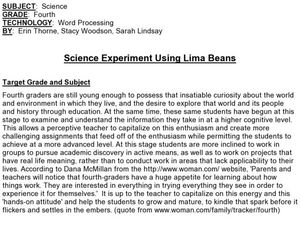Curated OER
Plant Seedling
Learners label seed parts and plant seeds. In this seeds lesson plan, students observe and learn about how seeds play a huge role in all plants and food.
Curated OER
Parts of the Plants that we Eat
First graders study plants and their parts to see what parts are edible. In this plant lesson students are assigned plant parts and they are to put them in the right category.
Curated OER
Growth of a Bean Documented by Child and Camera
Third graders photograph the growth of a bean plant and keep a daily written journal of observations. They drew, graphed and took notes on the plant growth which they compared to the photographic journal.
University of Southern California
Discovering Plants
Learners construct a small greenhouse and plant lima beans. They read books about plants, tend the lima bean seedlings, observe and record plant growth, taste a variety of plants and maintain plant journals.
Curated OER
Investigating Space Requirement of Seed Plants
Students use scientific methods to investigate the effects of overpopulation of seed plants on growth in a limited living space. Students relate seed plant population findings to that of other organisms.
Curated OER
How Does a Green Plant Grow?
Students examine how a seed grows, and design an experiment to explore this concept. They make predictions, conduct the experiment, record the results, and interpret the results.
Curated OER
Time Lapse Seed Germination with the QX3 Intel Digital Microscope
Young scholars use the time-lapse feature of the QX3 Intel Digital Microscope
to observe germination of seeds. They use the QX3 Intel Digital microscope to create time lapse video films of seed germination experiments.
Curated OER
Population Explosion Relay
Students study the concepts of seed dispersal, germination rate, exponential population growth, and predation by engaging in a bean 'weeds vs. natives' relay race. They illustrate how weeds out-compete other plants for space by crowding...
Curated OER
Are Seeds in Danger?
Eighth graders discuss uses and disposal of common household chemicals. They select a household chemical to test for impact on plant germination. Students decide how they want to set up a seed germination project. They design their plan,...
Curated OER
Germination Observations
Students germinate seeds under a variety of conditions. First, students read and discuss the background of gardening. After reviewing germination and the steps to the scientific method, groups of students complete experiments.
Curated OER
Beans and Birds: A Natural Selection Simulation
Students examine the problem concerning the evolution of seed color in pinto bean plants "How does natural selection change the frequency of genes or traits over many generations"? Students work in teams to design an experiment that...
Perkins School for the Blind
Creating a 3-D Model of a Plant Life
Instructing blind or visually impaired learners means you need to make symbolic tactile representations of various processes to provide as much input as possible. But wouldn't it be even better to have your learners make the models...
Curated OER
Will It Grow?
Fifth graders conduct experiments involving plants. In this science lesson, 5th graders design an experiment involving plants. Students use the scientific method to design their experiments.
Curated OER
Earth Day - Grow A Seed Garden
Young scholars discover how things grow and how they can take better care of the environment in this Earth Day lesson for the elementary classroom. The activity can be accomplished in one day and left in the sun until the "beans" begin...
Curated OER
Earth Day - Bursting Beans
Students fill jars with dried beans and water, cover the jars, and wait to see what happens in this excellent Science experiment ideal for Earth Day (April 22nd). Emphasis is placed on discovering the reactions of seeds to water.
Curated OER
Pumpkin Seed Multiplication
Learners practice multiplication facts. In this multiplication lesson plan, students participate in a pumpkin seed multiplication game where they match up addition sentences and multiplication facts. Game board and number sentences are...
Curated OER
How Does a Green Plant Grow?
Students of all ages can explore the question "how do seeds grow?", design an experiment to answer the question, predict the outcome of the experiment then conduct the experiment.
Curated OER
Science Experiment Using Lima Beans
Fourth graders tie together elements about the world and their environment. Students incorporate styles of higher order thinking skills. Students measure skills of observations, conclusions, inferences and predictions.
Curated OER
Creating a Three sisters Garden
Students understand that a three sisters garden is comprised of corn, beans and squash. For this three sisters garden lesson, students understand that Native Americans planted three sisters gardens and grow a three sisters garden....
North Clackamas Schools
Sorting Living and Nonliving Objects
Is a rock living? How about lima beans? You'll find everything you need for an interactive sorting activity exploring living and non-living things.
Curated OER
The Living Corn Necklace
Fifth graders generate two types of corn seeds, Dent corn and Indian corn to compare the similarities and differences of each of the seedlings. The preferred seedlings are determined through observations made by Students.
Curated OER
Dig In - Grow your own grub
Students monitor the growth of a plant over several weeks. In this earth science instructional activity, students plant a courgette plant, take digital photos, and upload them to the BBC gallery. They turn their photos into...
Curated OER
Biomes and Plant Growth
Seventh graders design four biomes models and plant three types of seeds in them to observe growth. In groups for each type of biome, they predict the seeds' growth in each of the settings. Students follow the conditions on a biome chart...
Curated OER
PLANT LIFE CYCLES
Student learns about the life cycle of plants by watching a time-lapse video. This activity provides young scholars with further evidence that all living things grow and change as they progress through their life cycle. Student conducts...
Other popular searches
- Growing Bean Seeds
- Lima Bean Seeds
- Soaking Lima Bean Seeds
- Planting Bean Seeds
- Growing Lima Bean Seeds
- Growing Bean Seeds Pea
- Biology Bean Seeds
- Pictures on Bean Seeds
- Variation Bean Seeds
- Seeds and Bean Mosaic
- Apple and Bean Seeds
- Lima Bean Seeds Stages


